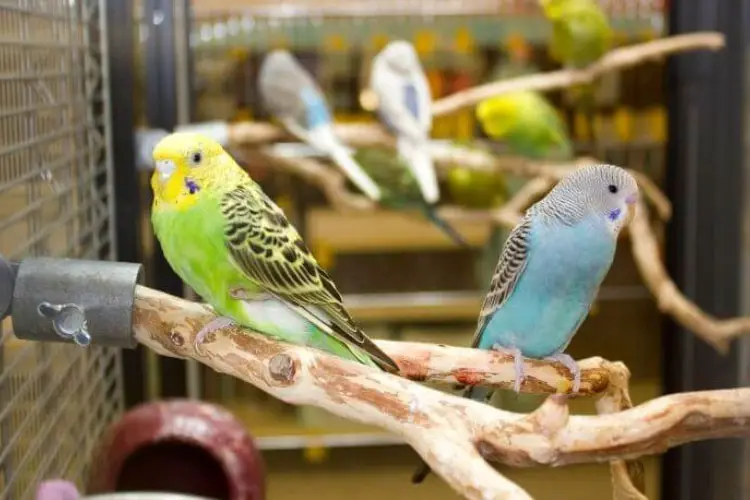In captivity, your pet budgie can live around 5 to 10 years or more. Since budgies show signs of discomfort before dying, you could prepare to bid them farewell by making them as comfortable as possible.
How to comfort a dying budgie? If your budgie is in its last days, they’ll probably show symptoms based on which a vet can tell you to prepare for the worst-case scenario. In those days, your budgie will demand you to soothe them more. So provide some extra TLCs by spending more time, feeding them properly (syringe feeding when necessary), giving supplements & medications, ensuring a peaceful environment, speaking softly, and providing them warmth.
All these efforts may not increase their lifespan, but they’ll surely ease the discomforts of your dying budgie. If you’re looking for more details about these TLCs, continue reading the article here.
What Signs of Discomfort Found In a Dying Budgie?
Although budgies have a great survival instinct and they hardly show their illness, there are still some signs that’ll help the vet decide their dying condition. Some of these symptoms include the following:
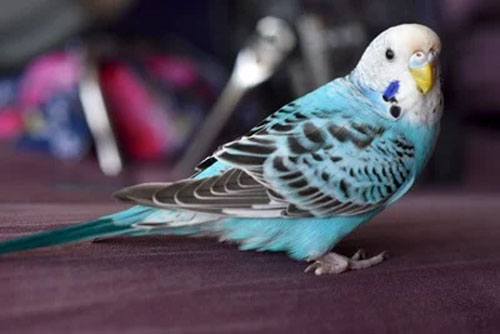
- Breathing Issues: Research says the respiratory system of the budgie is complex and they’re more vulnerable to suffer from respiratory infections with symptoms such as shortness of breath, breathing with the beak opened, wheezing, breathing harshly with the tail moving up & down, and neck straining because of disruption of oxygen intake.
- Decrease Activity: Budgies are active and playful. So one sign that they’re severely sick or nearing death is a significant drop in the activity levels that could include: not moving much, becoming less talkative, going off balance and falling off the cage perch, excessive sleeping, sleeping on the floor of the cage, or going lethargic.
- Droopy Head: The droopy head is a clear sign of severe sickness in budgies; it means they cannot hold their head high. It could also mean they’re suffering from unusual sleepiness, pain, or dietary issues.
- Vomiting & Loss of Appetite: When budgies are near death, they generally lose their appetite. They pretend to eat, but you should often find leftover food when you look closely. Some even vomit and might shake or bob their head while vomiting. They might also lose weight evidently.
- Unusual Feces or Urine: If your budgie is suffering from any life-threatening infection, you can most likely see it from their feces and urine. Liquid dropping without feces, blood spills in feces or urine, and yellow urine are all signs of severe sickness for the budgies.
- Inflammatory Skin Condition: You may see your budgie plucking out feathers or have some noticeable feather cysts. These symptoms can indicate severe infectious diseases for your bird.
How to Comfort a Dying Budgie?
When you come up with any of the above symptoms, rush to the vet to seek immediate medical attention. The medication can reduce the severity and help your budgie live more.
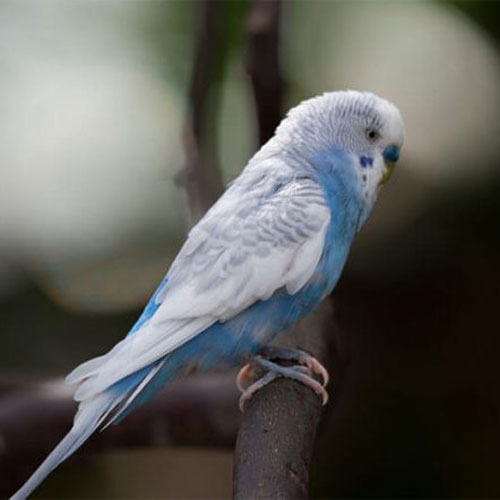
But if the conditions are irreversible, your vet will probably tell you to stay strong and prepare for the undesirable. Although you know they’re dying, you can do the following to make their final days comfortable and cherishable.
Also read: Budgie Rubbing Head on Perch
Spend Quality Time
Since the budgie’s been your friend, try to spend more quality time in his last days. They may not have the energy to entertain you by singing, playing, or dancing, but they’ll find your presence comfortable. You can read, work, and talk around them, so they know you’re there for them. Please speak with a soft, lower tone, so they’re not disturbed.
Maintain the Warmth
To comfort them in these conditions, always maintain the warmth and keep the temperature in their comfort range. They feel cozy in 70 to 80 degrees Fahrenheit and mightn’t like to be in the outside aviary. They won’t like the breezy drafts since it can create difficulty for them to maintain the optimal temperature.
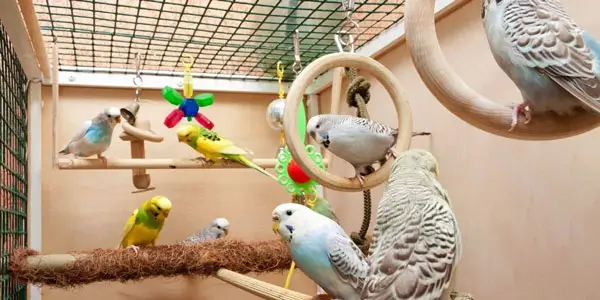
You can use a heater, bird-safe heat lamp, or humidifier to create a cozy environment. Also, use a cage cover to stop the breezes and make them feel warmer. If you want to hold your sick budgie, use a soft blanket and hold it close to the body to offer him the right warmth.
Provide Medications & Supplements
Give medications to your dying budgie as directed by the vet. Don’t discontinue because it can relieve them from the symptoms’ severity. Also, offer them supplements by consulting with the vet, such as calcium, amino acids, and vitamins. They’re given to the budgies to help their recovery or at least provide some strength to deal with the discomforts they’re facing.
Feed them Timely and Syringe Feed if Necessary
Although budgies lose appetite when severely sick, you should still give them timely meals. Consider millets, seasonal fruits, and leafy veggies. You can mash them to make them soft and easy for your budgie to eat. If you see they’re not eating on their own, you can syringe-feed them liquid meals. Also, ensure they drink plenty of water to maintain hydration and avoid worsening the condition.
Create A Peaceful Environment
Bright lights or direct sunlight can unsettle the sick budgies. To calm them down, you can dim the lights and make them feel it’s evening, something they find more relaxing. Also, keep your budgie’s cage in a quiet place where no noise is heard.
Keeping the Dying Budgie Away from Other Budgies
Budgies are social, and they love being in the companionship of other budgies. But when they’re sick, they find it unsettling to see other budgies roaming and making noise around them. So it’s better to separate the ill budgie away from others.
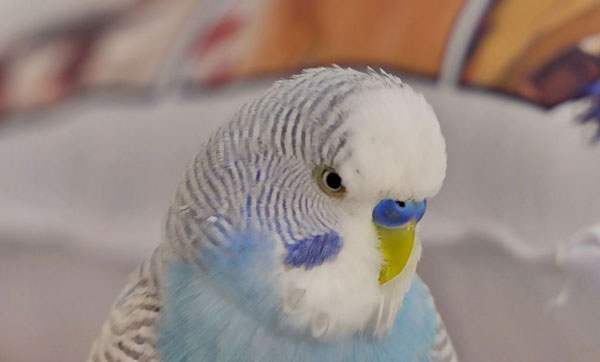
It’ll also help you to avoid negative effects on other fellow budgies. Because sometimes the sickness could be viral, quarantining the sick budgie can prevent the spread of the disease. Since your near-death bird requires extra care, putting it alone in a cage will also help you execute the particular treatment plans.
What to Do When Your Budgie Passes Away?
The demise of your beloved budgie is heartbreaking. But you must stay strong and plan to bury it. Most pet owners consider burying their dead pets in the backyard as it gives a permanent memorial to the pet. It’s also the most convenient and cheapest way for burial. But make sure to consult the local authorities. If there’s any cremate or pet cemetery in your area, you can also consider that to bury your beloved budgie.
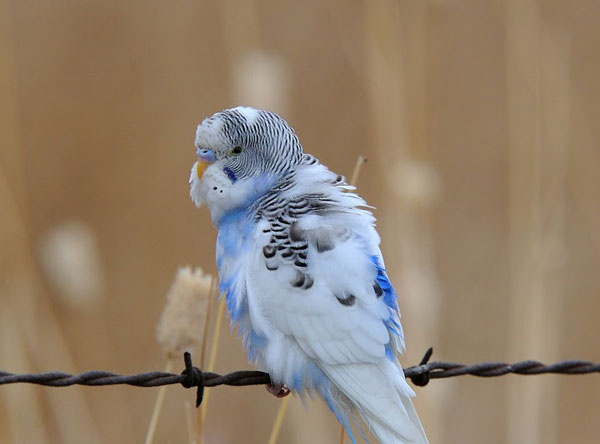
FAQs
If you’re left with some queries, check out some common FAQs answered here.
No, budgies don’t cry in any condition, although they have tear ducts. They don’t shed tears even if they feel pain, sadness, or disturbed.
The experts say the budgies mourn for the loss of their deceased companion for around 2 to 4 weeks. They’ll be seemed sad during that period and need some extra care during this transition to overcome the situation.
Related: Why Does My Budgie Keep Opening Its Mouth
Final Words
Losing a beloved pet is difficult. During their last days, you want to do whatever makes them happy, so they have a comfortable death. Since budgies die from severe sickness, they go through different discomforts and sufferings like every other animal. The fact that budgies conceal their discomfort or illness requires you to be more observant.
Don’t lose heart when you notice the symptoms of a dying budgie or get confirmation from the vet. Keep on providing them extra care: maintain the warmth and ensure a calming environment, try to be by them as much as possible, and give them food, water, and medication as directed by your vet. Also, separate them from other budgies as it’ll help your sick bird stay isolated and prevent the disease from spreading.
